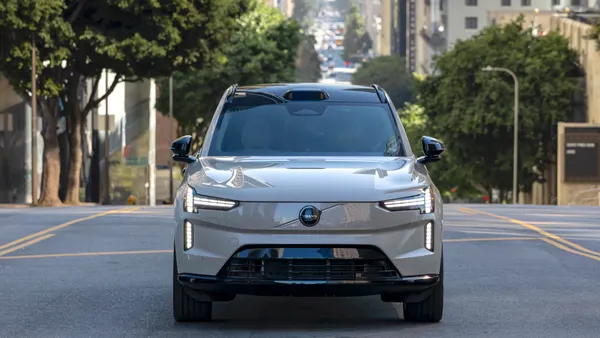Editor's note: This story is part of the WardsAuto digital archive, which may include content that was first published in print, or in different web layouts.
Special Coverage
North American Int’l Auto Show
Hyundai Motor America makes its highly anticipated foray into the luxury segment with its new Genesis sedan that goes on sale today in South Korea, just days ahead of its U.S. debut Sunday at the North American International Auto Show in Detroit.
The ’09 Genesis will be available with three engines when it goes on sale in the U.S. this summer.
The car marks many firsts for Hyundai, as it is the auto maker’s initial rear-drive model and offers its first V-8 engine.
Hyundai estimates the all-aluminum, Tau 4.6L engine will produce 368 hp and 324 lb.-ft. (439 Nm) of torque in the Genesis, bettering the horsepower figures of the Lexus GS, Infiniti M, Pontiac G8 and Chrysler 300 V-8s and generating the most horsepower per liter at 79.5.
Hyundai also notes its sedan joins the Chrysler 300 as the only two cars in the group to recommend regular unleaded gasoline, rather than premium.
It also predicts a 0-60-mph (97-km) time of “well under” 6 seconds.
“The Tau engine is built with flexibility for the future,” Hyundai says in a statement, adding future variants may have larger displacements and forced induction.
The 4.6L V-8 Tau will power sister brand Kia’s new Borrego SUV, as well, which also debuts in Detroit on Sunday.
In the Genesis, the Tau is mated to a ZF Friedrichshafen AG 6-speed automatic transmission with a manual-shift mode, marking the second time Hyundai has outsourced a 6-speed auto for one of its models (the Veracruz large cross/utility vehicle uses an Aisin AW Co. Ltd. unit).
Those wanting less power can opt for two V-6s, a 3.3L and 3.8L, borrowed from Hyundai’s Sonata and Azera models, respectively.
Hyundai says the 3.3L will make 268 hp and 233 lb.-ft. (316 Nm) of torque in the Genesis, while the 3.8L should produce 290 hp and 264 lb.-ft. (358 Nm) of torque. Both sets of numbers exceed the engines’ performance specs in the Sonata and Azera.
Continuously variable valve timing is employed on both the intake and exhaust cams of the V-6s offered in the Genesis. A new variable intake system, resulting in more efficient air exchange at both low and high engine speeds, gives the V-6 models quicker off-the-line acceleration and better passing performance, while improving fuel efficiency, Hyundai says.
The V-6s also are mated to a ZF 6-speed automatic transmission.
Hyundai is promoting the Genesis’ 5-link front and rear suspensions as “the most sophisticated and refined anywhere, at any price.”
It says the upper and lower arms linking the front wheels and chassis create a “virtual kingpin axis that dramatically reduces unwanted kickback through the steering wheel, as well as improving responsiveness.”
Amplitude selective dampers, also found in Lexus and BMW models, are employed to improve ride and driving comfort but not blunt handling or body and wheel control, Hyundai says.
Shifting to the cabin, buyers will discover features similar to those found on competing luxury models, such as a soft-touch instrument panel, Bluetooth hands-free technology, a heated and cooled driver’s seat and advanced audio and navigation systems.
Hyundai says other than the Rolls Royce Phantom, the Genesis is the only vehicle to offer a Lexicon audio system, which in the Genesis has 17 speakers and emits more than 500 watts.
Digital high-definition radio is a factory option, the auto maker adds.
Among exterior features are xenon high-intensity discharge headlights and an automatic windshield defogger with humidity sensor and rain-sensing wipers.
Standard safety features include an electronic stability control system that has become Hyundai’s technological calling card, as well as eight airbags.
Making its Hyundai debut is an electronic active front head restraint system, similar to those offered on select German luxury models. Forward-looking radar and eight ultrasonic sensors, part of the cruise control and parking-assist systems, respectively, round out the Genesis’ safety offerings.
John Krafcik, HMA vice president-product development, acknowledges the Genesis will compete with lesser-priced cars such as the Chrysler 300 and Pontiac G8, but says the car’s engineering benchmarks were the Mercedes E-Class, Infiniti M and Lexus GS.
“We think it has the opportunity to be an extremely disruptive force in the large sedan and near-luxury segments,” he says.
Hyundai also plans to retail a coupe version of the Genesis in the near future. A concept was shown at last fall’s Los Angeles auto show.











